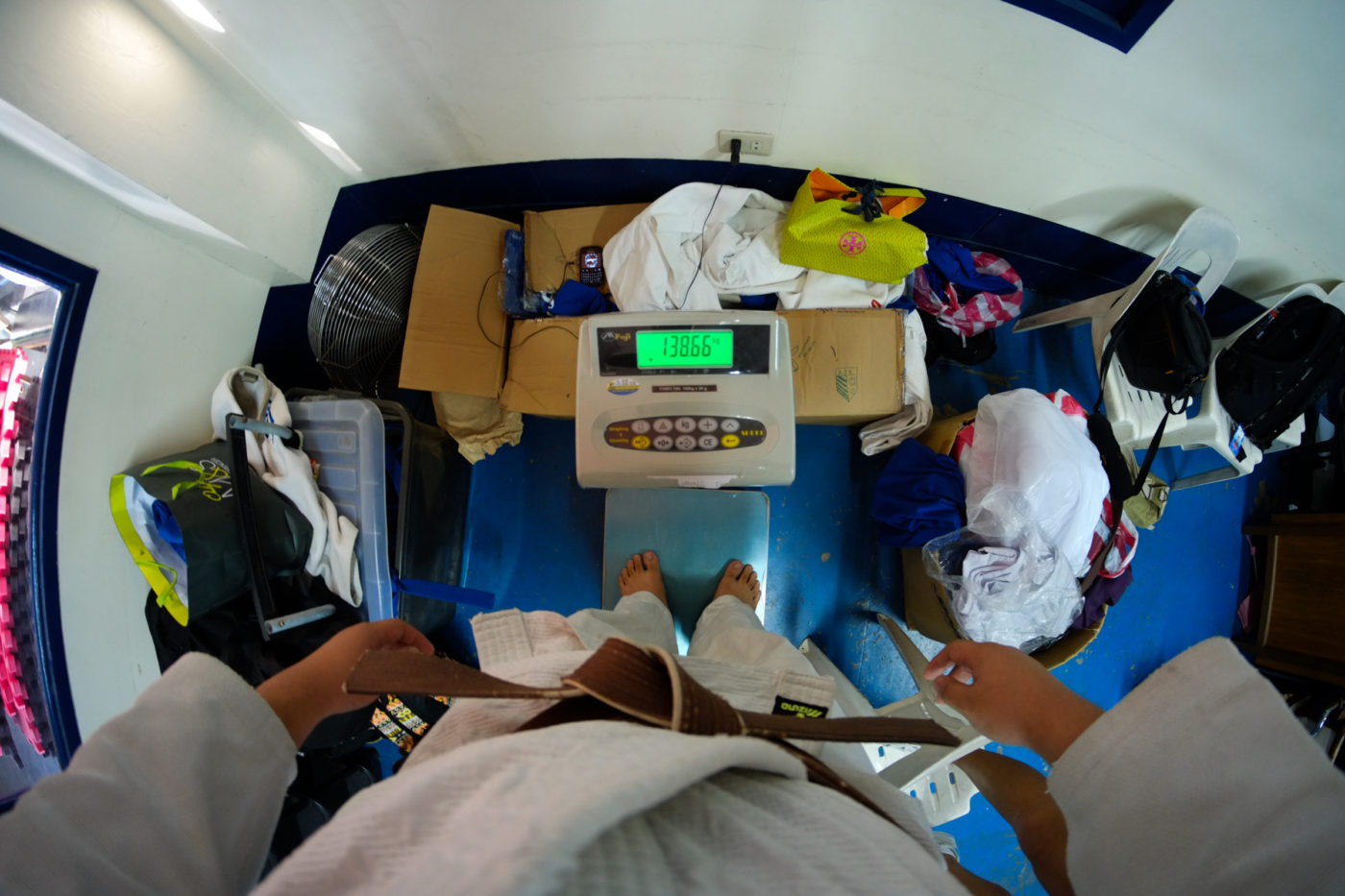“WHAT’S YOUR weight?”
Most people cringe at hearing this dreaded question, usually received from inquisitive relatives and out of touch friends. But generally, many know the difficulties of trying to reach a certain weight and are mindful enough to keep the topic under hushed tones.
However, for the men and women who represent their schools in the martial arts, the matter of weight has lost its taboo. Members of the Ateneo Judo and Taekwondo teams are no strangers to the practices of weight cutting and gaining. For them, their weight is but a number, an obstacle in the way of their ultimate goal: The gold medal.
Weight divisions
For their main tournament in the University Athletic Association of the Philippines (UAAP), players from both Judo and Taekwondo compete in seven weight divisions. For the Blue and Lady Judokas, it ranges from Extra Lightweight (-60kg for men, -48kg for women) to the Heavyweight division (+100kg for men, +78kg for women). For the Blue and Lady Jins, it ranges from Finweight (-54kg for men, -48kg for women) to Heavyweight (+78kg for men, +67kg for women).
For Judo Program Head and Coach Ali Sulit, there are several factors involved in deciding a Judoka’s division. Height, body type, matchups and technique are all factored in when deciding the weight a Judoka will end up in. Blue Jins Team Captain Joel Alejandro agrees with Coach Ali’s sentiments, but mentions that at times, some fighters are forced to fight in higher weight classes due to the number of jins competing in one weight class. So although rookies may come into training weighing just right for a certain division, it is no guarantee that they will be competing in that same weight come the UAAP tournament.
Such was the case for one Lady Judoka, Elyza Bagos. Her rookie campaign started in her sophomore year, where she came into training weighing 85 kilograms, a clear-cut heavyweight. However, circumstances forced her to go down an incredible two weight divisions, which means she had to lose at least 33 pounds. “No one was in the [middleweight] division; it was an empty division in the team. We were short of members. The captain at the time told me that coach wanted me to play in that division. He thought I had more chance,” Bagos shares.
Faced with such a tall task, Bagos instead saw it more as a challenge to herself rather than a deterrent to her goals. “I felt I was up to the challenge. Since to achieve my goal, I had to be in weight, or else I couldn’t compete if I’m not in weight,” she says. “It’s discipline. If I am able to do this, it means I can control myself, I can make myself do things I never thought I can do. It’s my motivation.”
However, Bagos herself admits that the methods she used to achieve such goals weren’t the most ideal. Right after hearing of the division change, the next few months saw Bagos on a weight loss frenzy. During training, she would wear layers of clothing, even a sauna suit, to maximize her sweat loss. When not in training, she would be seen running around campus for 45 minutes, three times a day. All of this on a diet of oatmeal during breakfast, lunch and dinner.
Another sacrifice that fighters—like Alejandro of the Ateneo Blue Jins—make, is competing in a higher weight class. For the past two seasons in the UAAP, Alejandro has had to put on extra weight because the team needed players in the heavier weight classes. The jins were limited in their lineup because only one player can compete per weight division.
This served as a tough adjustment period for Alejandro, as maintaining the diet was a struggle for the veteran fighter. Additional calorie intake was not the only factor in reaching the weight class—he also had to avoid eating any unnecessary junk food. Furthermore, had to adapt quickly and learn how to fight in his new weight class.
But whenever Alejandro competes in offseason tournaments, he drops to the lower weight divisions he can compete in. This puts the pressure on him to regain the weight that he dropped and gives himself ample time to prepare for his heavier UAAP division.
Support system and self-discipline
Despite weight watching being an individual effort, a strong support system is all but required of a Judoka in order to reach her goals. Lady Judokas Team Captain Dany Ty is proud to say that the team has a deep sense of camaraderie that keeps them all together. “They do [open up] all the time. I’d be like, ‘Oh, how’s your weight?’ They don’t hide from me,” she says.
Bagos shares that alongside her teammates, it was her family that supported her throughout those difficult months. They were there for her when her diet was reaching radical levels. “My parents knew, my family knew. They were supporting me. They knew I had a goal. They were just mad when I would not eat. They prefer that I eat even if it was just oatmeal rather than I skip a meal,” she says in a mix of English and Filipino.
On the other hand, gaining weight is a much more difficult process than it seems. Aside from an increase on each fighter’s food intake, they have to train their body to carry the excess baggage. On top of fighting heavier fighters during each competition, jins like Alejandro carry the extra weight into the offseason for their body to get used to it.
The constant fluctuation of weight shows the grit of the Ateneo Taekwondo team, as they endure a much more individualistic approach to the process. Alejandro shares that self-discipline and mental fortitude are integral components for each fighter as there isn’t a nutritionist who watches your every meal. Each fighter has to be on top of his or her weight situation, whether that means cutting his or her food intake or wearing sauna suits to training. “My motivation in losing or gaining weight is that I have to play. If not, it’s either I or my teammate who doesn’t get to fight,” he says in a mix of English and Filipino.
Cutting it close
Ty remembers a story in her freshman year, when one of the veterans on the team was four kilograms overweight a day before weigh-ins. “He wouldn’t eat or drink for 24 hours. That was nine pounds? And he overcame it. I mean, he was dehydrated and he was really thin. He made weight but his performance was bad,” she says in a mix of English and Filipino.
Alejandro shares a similar story of one of his teammates, who was at risk of being overweight during the weigh-in that in order to prevent dehydration, he would intake water but immediately spit it out. This would allow him to weigh at his lightest come the weigh-in.
Years later, Ty now has a better grasp of fitness and proper nutrition. She repeatedly emphasizes that a Judoka should be in weight at least a month before a competition. This is done so that the player’s body is able to get used to the sudden change in weight. “It happens to everyone. If you’re trying to make weight, your performance will really dip. But later on, as they get used to their weight, they’ll get stronger,” she says.
Despite all that effort however, players and coaches alike admit that gaining all the weight back is inevitable once the UAAP is over. Nevertheless, the habits and mindsets these players have developed still remain.
“At the end of it all, if you eat healthy, it becomes a habit. It’s really hard, for me, to not eat healthy,” Ty says. “When I go back to my regular food schedule, it’s really healthy, I realize. Except I have rice.”
What do you think about this story? Send your comments and suggestions here: tgdn.co/2ZqqodZ







